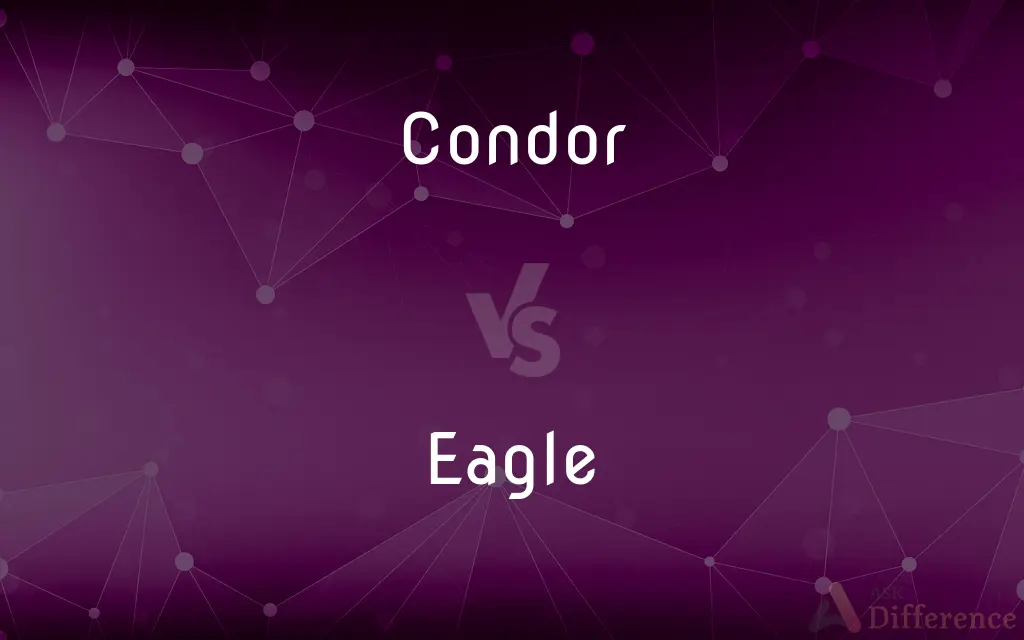Condor vs. Eagle — What's the Difference?
Edited by Tayyaba Rehman — By Urooj Arif — Updated on March 26, 2024
Condors are among the largest flying birds with broad wings for soaring, while eagles are powerful predators known for their agility and strength in flight.

Difference Between Condor and Eagle
Table of Contents
ADVERTISEMENT
Key Differences
Condors, specifically the Andean and California species, are recognized for their massive wingspans, which can reach up to 10 feet, facilitating their ability to soar for hours without flapping. Eagles, on the other hand, encompass various species across the globe, such as the Bald Eagle and the Golden Eagle, with wingspans typically ranging from 6 to 8 feet. Eagles are admired for their hunting prowess, using their powerful talons and keen eyesight to catch prey.
While condors are scavengers, feeding primarily on carrion, this dietary habit aids in keeping their environment clean. Eagles, however, are apex predators, feeding on a wide range of live prey, including fish, small mammals, and birds, showcasing their role at the top of the food chain.
Condors have a more limited distribution, with the Andean condor found in South America and the California condor in North America, particularly in specific regions due to their conservation status. Eagles are more widely distributed, with species inhabiting continents worldwide, adapting to a variety of habitats from mountains to forests and open waters.
Conservation efforts for condors have been critical, especially for the California condor, which faced near-extinction and has been the subject of intensive recovery programs. Eagles have also faced threats, including habitat loss and poisoning, but conservation measures, such as the banning of DDT in the United States, have helped some species, like the Bald Eagle, to rebound.
The cultural significance of both birds is profound, with condors revered in South American indigenous cultures as symbols of power and renewal, while eagles hold emblematic status in many countries, representing freedom and high ideals, most notably as the national symbol of the United States.
ADVERTISEMENT
Comparison Chart
Wingspan
Up to 10 feet (Andean Condor)
6 to 8 feet for most eagles
Diet
Scavengers, feeding on carrion
Predators, feeding on a variety of live prey
Distribution
Limited, mainly in specific regions of South and North America
Widespread, with species found on every continent except Antarctica
Conservation
Subject of intensive recovery programs due to near-extinction
Various conservation statuses, with some species rebounding
Cultural Significance
Revered in South American cultures
Emblematic status in many countries, including as the national symbol of the USA
Compare with Definitions
Condor
Known for their impressive wingspan and ability to soar without flapping.
Observers marveled at the condor's effortless flight against the backdrop of the Andes.
Eagle
Widespread distribution, adapting to various habitats.
Eagles nest in high places, from mountains to tall trees and cliffs.
Condor
Feeds primarily on dead animals, playing a crucial role in the ecosystem.
A group of condors was seen feeding on a carcass in the valley.
Eagle
Emblematic in many cultures, symbolizing freedom and strength.
The eagle appears on the national emblem of multiple countries, symbolizing soaring aspirations.
Condor
Endangered species with focused conservation efforts.
The California condor has been part of successful breeding and release programs.
Eagle
Conservation efforts have led to the recovery of certain species.
The Bald Eagle's population has rebounded thanks to DDT bans and habitat protection.
Condor
Symbol of power and renewal in South American indigenous cultures.
The condor is a central figure in many Andean myths.
Eagle
A powerful bird of prey with a strong beak and talons, known for agility.
The eagle swooped down to catch its prey with unmatched precision.
Condor
A type of large vulture with a wingspan of up to 10 feet, known for soaring.
The Andean condor glided above the mountain peaks, scanning the ground below.
Eagle
Predatory diet, showcasing their role as apex predators.
The Bald Eagle is often seen plucking fish from the water with its talons.
Condor
Condor is the common name for two species of New World vultures, each in a monotypic genus. The name derives from the Quechua kuntur.
Eagle
A 13th-century coin minted in Europe and circulated in England as a debased sterling silver penny, outlawed under Edward I of England.
Condor
A very large New World vulture with a bare head and mainly black plumage, living in mountainous country and spending much time soaring on massive outstretched wings.
Eagle
Eagle is the common name for many large birds of prey of the family Accipitridae. Eagles belong to several groups of genera, some of which are closely related.
Condor
Either of two New World vultures, Vultur gryphus of the Andes or Gymnogyps californianus, a nearly extinct vulture of the mountains of California, having a bare head and neck and dull black plumage containing variable amounts of white. With a wingspan of about 3 meters (10 feet), they are among the largest birds in the world.
Eagle
Any of various large diurnal birds of prey of the family Accipitridae, including members of the genera Aquila and Haliaeetus, characterized by broad wings, a hooked bill, keen vision, and soaring flight.
Condor
A gold coin of some South American countries bearing the figure of one of these vultures.
Eagle
A representation of an eagle used as an emblem or insignia.
Condor
Either of two New World vultures, Vultur gryphus of the Andes or Gymnogyps californianus, a nearly extinct vulture of the mountains of California.
Eagle
A gold coin formerly used in the United States, stamped with an eagle on the reverse side and having a face value of ten dollars.
Condor
A gold coin of some South American countries bearing the figure of one of these vultures.
Eagle
(Sports) A golf score of two strokes under par on a hole.
Condor
An Argentinian short range ballistic missile.
Eagle
To shoot (a hole in golf) in two strokes under par.
Condor
(golf) The completion of a hole four strokes under par (a quadruple birdie, triple eagle, or double albatross).
Eagle
To score an eagle in golf.
Condor
(finance) A combination of four options of the same type at four strike prices, giving limited profit and limited risk.
Eagle
Any of several large carnivorous and carrion-eating birds in the family Accipitridae, having a powerful hooked bill and keen vision.
Condor
A very large bird of the Vulture family (Sarcorhamphus gryphus), found in the most elevated parts of the Andes.
Eagle
A gold coin with a face value of ten dollars, formerly used in the United States.
Condor
The California vulture (Gymnogyps californianus), also called California condor.
Eagle
(golf) A score of two under par for a hole.
Condor
A gold coin of Chile, bearing the figure of a condor, and equal to twenty pesos. It contains 10.98356 grams of gold, and is equivalent to about $7.29. Called also colon.
Eagle
(golf) To score an eagle.
Condor
A gold coin of Colombia equivalent to about $9.65. It is no longer coined.
Eagle
Any large, rapacious bird of the Falcon family, esp. of the genera Aquila and Haliæetus. The eagle is remarkable for strength, size, graceful figure, keenness of vision, and extraordinary flight. The most noted species are the golden eagle (Aquila chrysaëtus); the imperial eagle of Europe (Aquila mogilnik or Aquila imperialis); the American bald eagle (Haliæetus leucocephalus); the European sea eagle (Haliæetus albicilla); and the great harpy eagle (Thrasaetus harpyia). The figure of the eagle, as the king of birds, is commonly used as an heraldic emblem, and also for standards and emblematic devices. See Bald eagle, Harpy, and Golden eagle.
Condor
Largest flying birds in the western hemisphere
Eagle
A gold coin of the United States, of the value of ten dollars.
Eagle
A northern constellation, containing Altair, a star of the first magnitude. See Aquila.
Eagle
The figure of an eagle borne as an emblem on the standard of the ancient Romans, or so used upon the seal or standard of any people.
Though the Roman eagle shadow thee.
Eagle
Any of various large keen-sighted diurnal birds of prey noted for their broad wings and strong soaring flight
Eagle
(golf) a score of two strokes under par on a hole
Eagle
A former gold coin in the United States worth 10 dollars
Eagle
An emblem representing power;
The Roman eagle
Eagle
Shoot in two strokes under par
Common Curiosities
What is the main difference between a condor and an eagle?
The main difference lies in their feeding habits: condors are scavengers, while eagles are powerful predators.
Which has a larger wingspan, a condor or an eagle?
A condor has a larger wingspan, with the Andean condor's reaching up to 10 feet.
Where can you find condors in the wild?
Condors are found in specific regions of South America (Andean condor) and North America (California condor), often in mountainous or open terrain.
Are condors endangered?
Yes, particularly the California condor, which has been the focus of extensive conservation efforts.
Why are eagles considered symbols of power?
Their predatory nature, majestic flight, and significant presence in folklore and national symbols contribute to their power symbolism.
Can condors hunt live prey?
Condors are primarily scavengers and do not typically hunt live prey, relying instead on carrion for food.
How have conservation efforts impacted eagles?
Conservation efforts, such as banning harmful pesticides and protecting habitats, have helped some eagle populations to rebound, notably the Bald Eagle.
What role do condors play in the ecosystem?
As scavengers, condors play a critical role in the ecosystem by consuming dead animals, thus helping to prevent the spread of disease.
What adaptations do eagles have for hunting?
Eagles have sharp talons, keen eyesight, and powerful wings, enabling them to hunt efficiently.
Why are condors significant in South American culture?
Condors are revered in South American indigenous cultures for their symbolic meanings associated with power, freedom, and renewal.
Share Your Discovery

Previous Comparison
Fatigue vs. Lassitude
Next Comparison
Avoid vs. EscapeAuthor Spotlight
Written by
Urooj ArifUrooj is a skilled content writer at Ask Difference, known for her exceptional ability to simplify complex topics into engaging and informative content. With a passion for research and a flair for clear, concise writing, she consistently delivers articles that resonate with our diverse audience.
Edited by
Tayyaba RehmanTayyaba Rehman is a distinguished writer, currently serving as a primary contributor to askdifference.com. As a researcher in semantics and etymology, Tayyaba's passion for the complexity of languages and their distinctions has found a perfect home on the platform. Tayyaba delves into the intricacies of language, distinguishing between commonly confused words and phrases, thereby providing clarity for readers worldwide.












































